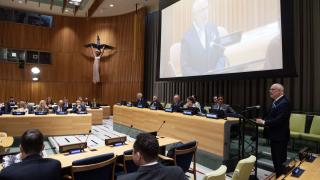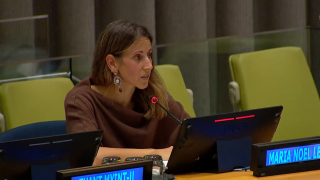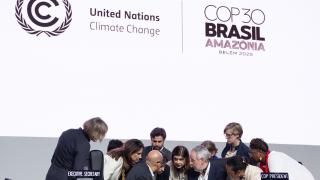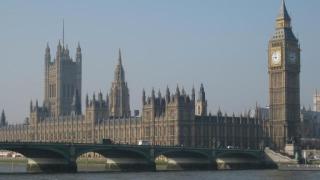
This article was originally published on the 1 for 8 Billion website. UNA-UK is on the steering committee for the 1 for 8 Billion campaign.
During UNGA High-Level Week—while Heads of State debated the UN’s purpose and future—one point became clear: if the UN is to prove its relevance, it will start with the choice of its next Secretary-General (SG), and with how that choice is made.
On 23 September, the 1 for 8 Billion campaign co-organised a high-level event with the Government of Estonia, the International Peace Institute (IPI), CIVICUS and UNA-UK. The event, taking place during the UN’s busiest week of the year, featured statements from 12 senior member state representatives alongside civil society leaders and academics on the topic "A New Vision for Global Leadership: Selecting the Next UN Secretary-General".
1 for 8 Billion used the event to underscore the importance of the General Assembly’s (GA) 2015 rules—strengthened through successive resolutions, including Resolution 69/321—which provide key procedural elements: a public list of candidates, dialogues, vision statements, financial disclosures, civil society participation and core expectations for the role. But, the statement noted, these rules “must be seen as a starting point — the floor, not the ceiling”, while urging the President of the General Assembly (PGA) and GA to build on them.
The event opened with remarks by H.E. Alar Karis, President of Estonia, and a panel moderated by Jeffrey Feltman, Non-Resident Adviser at IPI with H.E. Arnoldo André Tinoco, Minister of Foreign Affairs of Costa Rica; H.E. Oana-Silvia Toiu, Minister of Foreign Affairs of Romania; H.E. Jeppe Tranholm-Mikkelsen, Permanent Secretary of State for Foreign Affairs of Denmark; Thant Myint-U, Chairman of U-Thant House; and GQUAL’s Director Ms. Maria Noel Leoni representing the 1 for 8 Billion campaign.
President Karis set the tone: the next SG must be a principled leader who can restore faith in the UN as a guardian of peace. This, he said, requires a selection process that is fair, robust and transparent while noting that this process will set the tone for the credibility of the successful candidate.
Costa Rica’s foreign minister highlighted his country’s 15 year quest to strengthen the selection process, noting that civil society worked successfully with states to drag it “out of the shadows” in 2015-16. Mentioning 1 for 8 Billion by name, Minister Tinoco noted the positive role played by civil society throughout this period while urging further advances to boost transparency and civil-society participation. The minister also called for a stronger role for the GAunder existing rules.
Romania’s foreign minister highlighted her country’s role in facilitating the recent negotiations, together with South Africa, which resulted in General Assembly Resolution 79/327. While acknowledging that there were missed opportunities, Minister Ţoiu pointed to the Resolution as a strong achievement, making progress on vital elements including: a clear timeline for start and end date of process; ethical standards including financial disclosures; more substantive and interactive exchanges for member states with candidates; and recognition of the need to address historical gender imbalance, calling on member states to nominate women candidates.
Representing Denmark, Minister Tranholm-Mikkelsen emphasized that a transparent, merit-based process with substantial GA involvement is essential to choose a candidate who meets the Charter’s bar for efficiency, competence, and integrity, with proven leadership, commitment to multilateralism and international law, and strong diplomatic and multilingual skills. The minister went on to call for a strengthened role for the GA and the inclusion of civil society in the process, finishing by stating that it was “high time” for the first woman SG.
Representing 1 for 8 Billion, Maria Noel Leoni flagged three priorities where Member States and GA leadership are essential.
- Define qualifications up front. Develop a shared, substantive understanding of the skills and profile required — so the GA can hold candidates considered by the Security Council to the highest standards.
- Select a woman Secretary-General. This is a question of fairness and states’ international obligations—and of the UN’s legitimacy and the leadership this moment demands.
- Ensure meaningful civil society participation. Make the process more transparent, accountable, and connected to the realities of the people the UN was created to serve. This requires civil society participation every step of the way and opportunities for direct engagement with candidates on a broad range of issues.

Further discussion: support for a woman SG and a more inclusive and transparent process
The panel was followed by remarks from the floor from representatives of Finland, México, Japan, France, Brazil, Norway, and Switzerland. All interventions promoted concrete measures to further improve the upcoming process with recurring themes including the need for a woman SG, a larger role for the GA and a more inclusive, transparent process.
Time for a woman SG
Almost all interventions reinforced the need to appoint a woman Secretary-General. Finland remarked this would be a bold affirmation of the UN’s shared values, including gender equality and equal opportunities—with many States noting the breadth of qualified women highlighting the need for states to nominate and support women candidates. Mexico highlighted that there are 4 billion women in the world and, of them, “we must choose the best one”. In Mexico’s view it is time for a Latin American woman to hold this role.
Brazil built on this, suggesting that women from underrepresented regions should be nominated while highlighting that Latin America had only produced one out of nine SGs "underscoring a profound regional imbalance".
France noted that it was the only P5 state to support a joint statement from Slovenia, Spain and Mexico, calling for support for a woman SG.
A stronger role for the General Assembly
Brazil and Switzerland joined Estonia, Costa Rica, Denmark and Finland in highlighting the need for a greater role for the General Assembly in the upcoming process. Switzerland recalled the position held by ACT - the 27 state bloc of member states committed to Accountability, Coherence and Transparency - that the Security Council should recommend two or more candidates for GA's consideration.
A more inclusive, transparent process
Switzerland supported strengthened engagement with civil society, noting that this is a position held by ACT and reinforcing the opening remarks made by Estonia, Costa Rica, and Denmark.
Japan stressed the importance of the role of the E10 in the SC process, referring to their experience in the 2016 process when, as SC President, theyconvened informal meetings with nine candidates and held the initial series of straw polls. The representative from Japan reiterated Ambassador Korro Besho’s recommendations for reform - the Japanese diplomat who presided over the SC at that time - promoting the need for the establishment and publication of SC rules of procedure by January 2026 and the official announcement of the results of straw polls in the Security Council.
What next?
The process is now visibly under way. Hours after our event concluded, Chile announced it would nominate former President Michelle Bachelet - an early marker of momentum and a reminder that women stand ready to lead and that more States should follow the example. The week’s events and conversations underscored that this choice will shape the UN’s future at this critical time - and that the integrity of the process matters as much as the outcome. With strong appetite among Member States to have meaningful say, the moment is now for the PGA and the General Assembly to act and ensure a more transparent and inclusive process. In that process, civil society is watching and ready to contribute, as key partners invested in having the UN succeed.
Find out more
- Read Maria’s full speech here
- Watch back the event here
- Read our latest research on support for a woman SG
- Check out the candidates page
- Join the 1 for 8 Billion campaign
Banner image: Alar Karis, President of Estonia addresses High-level side event "Selecting the Next UN SG". Credit: UN Photo/Eric Kanalstein.
Gallery image 1: Maria Noel Leoni addresses the event on behalf of the 1 for 8 Billion campaign. Credit: UN Web TV.






